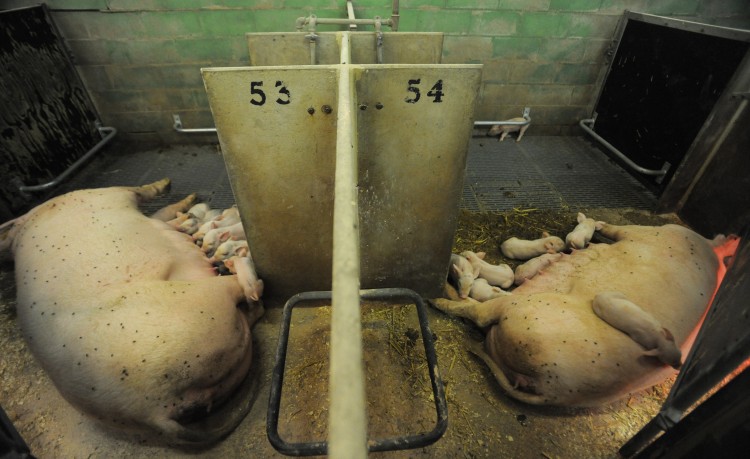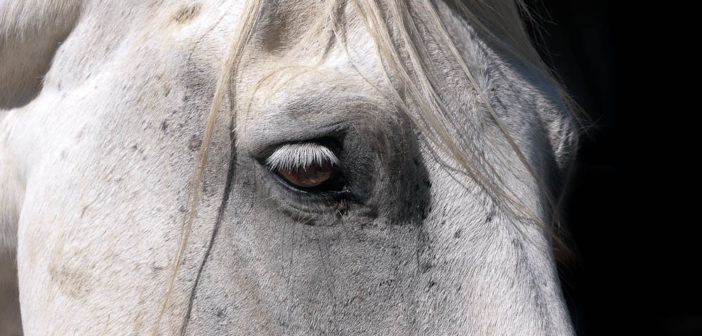Big pharma is making huge profits from the torture of horses for a hormone called Pregnant Mare Serum Gonadotrophin (PMSG), which is only found in the blood of mares during early pregnancy. PMSG is used by the multi-billion-dollar hog production industry to artificially induce receptiveness to breeding in sows, in order to increase the number of pregnancies each sow can have in a year. It’s one cruel industry feeding another: mares are forcibly impregnated and aborted in order to draw their blood, which is used to get sows pregnant sooner so they will have a higher number of piglets who are born to die. Yet another reason not to eat animals or use animal products that promote systemic animal cruelty.
The drug is used to make sows fertile earlier than they would be normally, and to shorten the time between pregnancies—all to increase the number of piglets produced in a year. Most mammals, including pigs, have a natural post-birth hormone level that prevents them from becoming pregnant again too soon. This allows the mother’s body to rest and recuperate from birth and continue nursing her young. Sows suffer when they are forced into pregnancies sooner than their bodies are physically prepared for.

Horse blood farms in the U.S. are just one more way that companies are making millions of dollars off horses for pharmaceutical profits. In this relatively unknown and highly unregulated industry, female horses are kept continuously pregnant in order to have their blood extracted as often as possible. To accomplish this, their pregnancies are aborted before term, only to begin another unnaturally induced pregnancy.
PMSG is used for a variety of purposes, including biological research, veterinary drugs for the pig industry and diagnostic manufacturing. It is produced and sold by several large U.S. and European pharmaceutical companies, including Merck (MSD), and sold for use in the European Union, U.S. and China.
This inhumane and secretive business is cruel to horses in many ways. Workers routinely take ten liters of blood from a horse in a single extraction—almost a quarter of the horse’s total blood, which can lead to hypovolemic shock, anemia and death. With a lack of supervision and regulation, workers often handle the horses abusively, using electric prods, sticks, and boards. Horses are often not provided with adequate nutrition, water, veterinary care or hoof care.
When mares do deliver, the fillies (females) are destined for the same horrible, painful life of the mother, while the foals (males) are sold to slaughter, considered a by-product of this unethical industry. When the adult mares can no longer hold a pregnancy, they too are shipped to slaughter.
In the U.S., this industry is very poorly regulated by the USDA, which rarely carries out inspections on blood farms, both because the Animal Welfare Act does not apply and because the budget for the USDA has been radically cut under the Trump administration. The farms are located secretively in rural areas, so as not to be targeted or accessed. Farms also operate in South America, where they are subject to even fewer regulations. Dr. Cabanas, president of the National Animal Welfare Committee in Uruguay, told investigators that he believes “foreign pharmaceutical companies take advantage of the fact that in some developing countries there are no laws regulating the production of PMSG and consequently no controls.”
What You Can Do
- Speak out. Speak out against this horrific practice and industry. Spread this information and share it on social media to raise awareness so more people become engaged.
- Contact pharmaceutical companies. Contact companies and demand the use of synthetic hormones in developing these drugs. Ask them to move away from animal-based products, and call for “a complete ban of PMSG production.”
- Subscribe. Subscribe to SumOfUs.org, an active voice in the effort to stop horse blood farms.
- Sign. Sign the Avaaz Petition to the members of the EU Parliament, and Change.org’s petition to end the use of PMSG in Canada.
View the original version of this post on the Humane Decisions website here.
Featured image: close-up of a horse’s face. Image credit Marco Caccin, CC BY-SA 2.0.






1 Comment
Please stop this !!!!